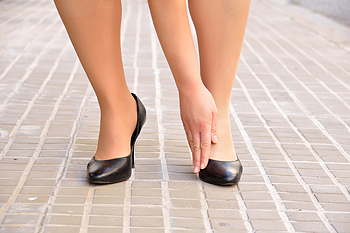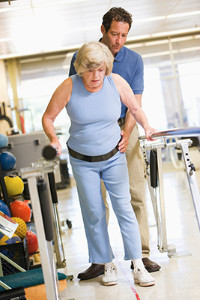March 2019
Wounds That Don't Heal Need to Be Checked
Obesity May Be a Cause of Plantar Fasciitis
 Research has shown patients who are overweight may develop heel pain. This may be a result of the excess pressure that is exerted on the heel, and may lead to the uncomfortable condition known as plantar fasciitis. Practicing consistent exercise is often recommended to lose additional weight, and this may be difficult to accomplish if chronic heel pain is present. There may be other types of heel pain that can develop as a result of being obese. These may include flat feet, bunions, or certain types of arthritis. If you are overweight, and have chronic foot pain, it is strongly suggested that you seek the counsel of a podiatrist who can properly assist you in treating any foot pain you may have.
Research has shown patients who are overweight may develop heel pain. This may be a result of the excess pressure that is exerted on the heel, and may lead to the uncomfortable condition known as plantar fasciitis. Practicing consistent exercise is often recommended to lose additional weight, and this may be difficult to accomplish if chronic heel pain is present. There may be other types of heel pain that can develop as a result of being obese. These may include flat feet, bunions, or certain types of arthritis. If you are overweight, and have chronic foot pain, it is strongly suggested that you seek the counsel of a podiatrist who can properly assist you in treating any foot pain you may have.
The more you weigh, the harder your feet must work to support your body. If you’re an obese individual and are concerned about your feet, contact Dr. Michael A. Wood from Foot Health Institute. Our doctor can provide the care you need to keep you pain-free and on your feet.
Obesity and Your Feet
People who are overweight are putting more pressure on their ankles, knees, and hips as well as their feet. This unfortunately can lead to variety of different issues.
Problems & Complications Stemming from Obesity
- When the body is overweight, it tries to compensate by changing the way that it moves. An obese person may lean forward and put extra weight on the wrong part of the foot. This puts unnecessary stress on the feet.
- Obese people are also more likely to develop type II diabetes which is a condition that causes a lot of foot problems. People with diabetes often don’t feel the cuts and sores that they may have on their feet, which can lead to more complicated and severe issues.
- Plantar fasciitis is another foot condition that can be caused by obesity. Plantar fasciitis is an inflammation of the tissue along the bottom of the foot, which causes pain and stiffness while walking and climbing stairs.
If you have any questions, please feel free to contact one of our offices located in Lansing, and Chicago, IL . We offer the newest diagnostic and treatment technologies for all your foot care needs.
Read more about Obesity and the FeetPossible Foot Conditions May Develop from Standing
 If you work on your feet and stand for the majority of the day, it is important to take care of your feet by choosing the correct shoes. They should have adequate arch support and the heel should be two inches or lower. There are several people who stand in one position for extended periods of time, and this may diminish blood flow to the muscles. Additionally, there may be other conditions that can develop from standing while you’re working. These may include swollen feet, plantar fasciitis, or Achilles tendinitis. It may be beneficial to take breaks which allows you to sit down and rest your feet as frequently as possible. Anti-fatigue mats may be helpful in providing extra support and cushioning that the feet need, and many people find it advantageous to wear cotton socks which are more breathable than nylons. If you would like additional information about how to take care of your feet while working, please speak to a podiatrist who can properly assist you.
If you work on your feet and stand for the majority of the day, it is important to take care of your feet by choosing the correct shoes. They should have adequate arch support and the heel should be two inches or lower. There are several people who stand in one position for extended periods of time, and this may diminish blood flow to the muscles. Additionally, there may be other conditions that can develop from standing while you’re working. These may include swollen feet, plantar fasciitis, or Achilles tendinitis. It may be beneficial to take breaks which allows you to sit down and rest your feet as frequently as possible. Anti-fatigue mats may be helpful in providing extra support and cushioning that the feet need, and many people find it advantageous to wear cotton socks which are more breathable than nylons. If you would like additional information about how to take care of your feet while working, please speak to a podiatrist who can properly assist you.
While working on the feet, it is important to take the proper care of them. For more information about working on your feet, contact Dr. Michael A. Wood from Foot Health Institute. Our doctor will treat your foot and ankle needs.
Working on Your Feet
Standing on your feet for long periods of time can cause stress and pain in your feet. Your whole body may experience change in terms of posture, back pain, bunions, callouses and or plantar warts. There are ways to avoid these conditions with proper foot care, smart choices and correct posture.
Positive Changes
Negative heeled shoe – Choosing this shoe type places the heel slightly lower than the ball of the foot. These are great for overall foot health. Find shoes that fit you correctly.
Go barefoot – Our feet were not designed to be enclosed for all hours of the day. Try to periodically expose your feet to air.
Eliminate Pain
Foot Exercises – Performing simple exercises, incorporating yoga and doing stretches are beneficial. This will allow increased blood flow to the area and muscles of the foot.
Achilles tendon – Stretching the foot out flat on the floor will relax the calf muscles and tendon. These exercises can be performed almost anywhere. Make sure you add these exercises to your daily regimen.
With a little bit of this information and knowing more about foot health, you will notice changes. Foot stretches and proper footwear will help with pain and prevent further issues.
If you have any questions please feel free to contact one of our offices located in Lansing, and Chicago, IL . We offer the newest diagnostic and treatment technologies for all your foot and ankle needs.
The Feet May Change as We Age
 There are many people that experience unwanted foot conditions as the aging process occurs. This may be a result of poor circulation or a loss of cushioning. It is important to wear shoes that fit properly and are comfortable, and it may be beneficial to measure your feet regularly, which may ensure a correct fit. Circulation may be improved by performing specific foot stretches, in addition to walking frequently during the day. Some of the typical foot ailments that many seniors face may include athlete’s foot, corns and calluses, or dry skin. Diabetic patients may need to check their feet daily for any cuts or bruises that may be present. If these should go unnoticed, complications may arise as a result of the inability to heal properly. If you would like additional information about how to care for elderly feet, it is suggested to speak to a podiatrist who can properly guide you.
There are many people that experience unwanted foot conditions as the aging process occurs. This may be a result of poor circulation or a loss of cushioning. It is important to wear shoes that fit properly and are comfortable, and it may be beneficial to measure your feet regularly, which may ensure a correct fit. Circulation may be improved by performing specific foot stretches, in addition to walking frequently during the day. Some of the typical foot ailments that many seniors face may include athlete’s foot, corns and calluses, or dry skin. Diabetic patients may need to check their feet daily for any cuts or bruises that may be present. If these should go unnoticed, complications may arise as a result of the inability to heal properly. If you would like additional information about how to care for elderly feet, it is suggested to speak to a podiatrist who can properly guide you.
If you need your feet checked, contact Dr. Michael A. Wood of Foot Health Institute. Our doctor will attend to all of your foot and ankle needs and provide you with quality treatment.
Geriatrics and Podiatry
When people age, some common issues that may occur are bone density loss, dry skin, poor circulation, and rough brittle nails. These issues may also affect your foot health if the necessary steps are not taken to alleviate the problems.
It is important to take care of your feet because feet that are injured or diseased can affect your overall health. Having painful feet hinders your ability to do daily activities or may decrease your willingness to do the things that you need to do.
Visiting Your Geriatrician
As we age, health problems become more likely, so it is essential to visit your doctor for check-ups to ensure that you are doing the best you can to take care of your health. It is recommended to check your feet frequently for any possible cuts, bruises, swelling, corns or any other irregularities.
Taking Care of Elderly Feet
Cracked or dry feet can be treated by applying moisturizer often. It is also important not to wear old socks because the older the sock is, the higher the possibility there will be that there is bacteria there. Wear fresh socks and make sure they fit properly.
Proper foot health means that you can have a more active lifestyle and you will not be bogged down by pain. Foot health also leads to good circulation, which is paramount for overall health.
If you have any questions, please feel free to contact one of our offices located in Lansing, and Chicago, IL . We offer the newest diagnostic tools and technology to treat your foot and ankle needs.
Read more about Geriatrics and Podiatry




